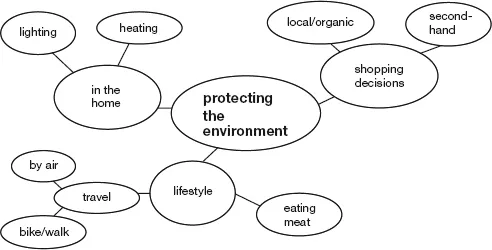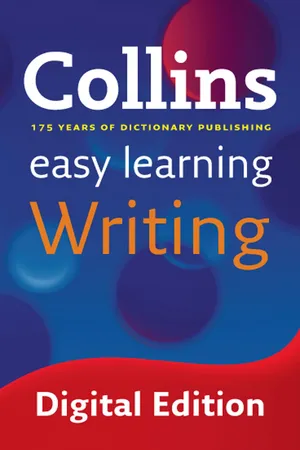eBook - ePub
About this book
Collins Easy Learning Writing is an easy-to-use guide on how to write good, clear and effective English.
With simple explanations of everything from the basics of sentence and paragraph structure, to writing CVs, letters and essays, this e-book is a valuable guide for anyone who wants to improve their writing.
Tools to learn more effectively

Saving Books

Keyword Search

Annotating Text

Listen to it instead
Information
Preparing to write
PART ONE
Preparing to write
Thinking about your writing
Whatever you are writing, it is important to think about it first.
If you plan your writing well, it will be clear, logical and effective.
If you plan your writing well, it will be clear, logical and effective.
You may think that planning your writing is just one extra job, and a waste of time, but in fact good planning will probably save you time as well as making your writing better.
Planning does not necessarily take a lot of time, and you do not always need to make a written plan. For instance, it would be silly to make a written plan for a text message – the whole point is that texting is a quick way of communicating. However, even with a text message, you should plan in your mind, so that you know what you want to say.
For longer pieces of writing, such as essays, reports, and often even letters, it is very useful to make a written plan. A plan will help you:
• organize your thoughts
• make sure you are clear about what you want to write
• make sure you have all the information you need
• make sure you don’t leave anything out
Key point to remember
Planning will save you time and make your writing more effective.
Before you start to write, the most important question to ask yourself is: What am I trying to achieve?
The best way to be clear about this is to ask three questions:
1. Who is this writing for?
2. What do I want to say?
3. Why do I want to say it?
Imagine, for example, that you really like animals, and you need a holiday job, so you decide to write to the local zoo. In this case, the answers to the questions above could be:
1. The manager or personnel officer of the zoo.
2. That you want a summer holiday job. That you love animals and worked on a farm last year.
3. Because you want to get a holiday job in a zoo.
There are important points to remember about each of these questions:
• Who? Make sure that you use a suitable style and tone for your audience. Informal language and jokes are fine for your friends, but a job application needs to be more formal.
• What? Make sure that what you say is absolutely clear, and that you have included everything you wanted to include.
• Why? Make sure the letter achieves what you want it to achieve. For instance, if you write a letter of complaint, be clear about what you want to happen: are you writing it because you want an apology, or do you want your money back?
Before starting to write, it can sometimes be helpful to make a brief summary of what you are trying to achieve. This can help you to concentrate on the most important points of your writing.
When you have finished your writing, you can go back to your summary and check that what you have written achieves what you wanted it to. A good summary will always answer the questions, who?, what? and why?
Here are two examples of this kind of summary:
A survey of students’ opinions of the food in our school canteen, to be used as the basis of a campaign for better school meals.
A letter of complaint to the manager of the local theatre to say that our recent visit was spoiled by the noise of building work going on in the bar area, and to ask for our money back.
Your summary can also help you resist the temptation to add too many details or extra points. Remember that many people are busy – if they do not understand your main points quickly, you may not achieve what you hope to achieve.
Key point to remember
Always be clear about the purpose of your writing.
Organizing your ideas
Whatever you are planning to write, you need to organize your ideas, either on paper, on your computer, or in your head.
There are several good things about this stage of writing:
• You do not need to worry about grammar and spelling
• You do not need to write whole sentences: single words, phrases, or even pictures are fine
• You do not need to put your ideas into any kind of order to begin with – that can come later
• The act of writing things down can give you new ideas
It is also fine to write down things that you don’t know!
Say, for instance, you are writing an essay about the causes of the First World War, a subject you have been studying in class. You might write down the things you know about, e.g. the Alliances between different countries, the assassination of Archduke Franz Ferdinand, the struggle between Britain and Germany to have military control of the seas.
Then you can add things you do not know, but think you ought to include in your essay. Examples might be: why were these Alliances formed?; who killed Franz Ferdinand and why?; what role did imperialism play in the arguments between countries?
These questions will help you to see what further research you need to do.
Tip for success
If you write down your ideas, you will not forget them!
When you have written down all your ideas, you need to put them in some kind of order. If you have a very clear idea of what your writing will contain, it may be possible to do this right from the beginning.
One simple way to order your ideas is to list them under different headings.
For instance, this writer is planning an article for her student magazine about working holidays abroad:
| Reasons to work abroad | Types of work available | Practical issues |
| chance to travel see ‘real’ life earn money make new friends work experience | voluntary v. paid teaching farm work tourist industry | legal: work permits, etc. safety cheapest way to travel there how much will you earn? |
It can be useful to be able to move your ideas around.
One possibility is to use Post-it® notes (small pieces of paper with one sticky edge) and arrange them on a table or a wall.
Imagine you are writing a party invitation. You want to include the date and time of the party, what it’s celebrating, that you need a reply to your invitation, that friends and partners are welcome and that you’d like people to bring drinks.
If you write all those things on Post-it® notes, you can make sure you include all the points you want to, and in the best order.
A very flexible way of ordering ideas is to use mind maps, or spider maps. In these maps, you start with the most important, central idea, and work out from there, using branches leading outwards. The more detailed the idea, the further the branches are from the central point.
This writer is planning to write a leaflet about what we can do to protect the environment:

Tip for success
A good mind map will help you structure your writing by showing you how points relate to each other.
Another method that is suitable for some kinds of writing is a flow chart. This writer is planning a letter to the local council to ask for repairs to the public football pitch:

Tip for success
As well as the things you want to w...
Table of contents
- Cover
- Copyright
- Introduction
- Contents
- Part One
- Part Two
- Part Three
- Index
Frequently asked questions
Yes, you can cancel anytime from the Subscription tab in your account settings on the Perlego website. Your subscription will stay active until the end of your current billing period. Learn how to cancel your subscription
No, books cannot be downloaded as external files, such as PDFs, for use outside of Perlego. However, you can download books within the Perlego app for offline reading on mobile or tablet. Learn how to download books offline
Perlego offers two plans: Essential and Complete
- Essential is ideal for learners and professionals who enjoy exploring a wide range of subjects. Access the Essential Library with 800,000+ trusted titles and best-sellers across business, personal growth, and the humanities. Includes unlimited reading time and Standard Read Aloud voice.
- Complete: Perfect for advanced learners and researchers needing full, unrestricted access. Unlock 1.4M+ books across hundreds of subjects, including academic and specialized titles. The Complete Plan also includes advanced features like Premium Read Aloud and Research Assistant.
We are an online textbook subscription service, where you can get access to an entire online library for less than the price of a single book per month. With over 1 million books across 990+ topics, we’ve got you covered! Learn about our mission
Look out for the read-aloud symbol on your next book to see if you can listen to it. The read-aloud tool reads text aloud for you, highlighting the text as it is being read. You can pause it, speed it up and slow it down. Learn more about Read Aloud
Yes! You can use the Perlego app on both iOS and Android devices to read anytime, anywhere — even offline. Perfect for commutes or when you’re on the go.
Please note we cannot support devices running on iOS 13 and Android 7 or earlier. Learn more about using the app
Please note we cannot support devices running on iOS 13 and Android 7 or earlier. Learn more about using the app
Yes, you can access Easy Learning Writing by in PDF and/or ePUB format, as well as other popular books in Languages & Linguistics & Linguistics. We have over one million books available in our catalogue for you to explore.
